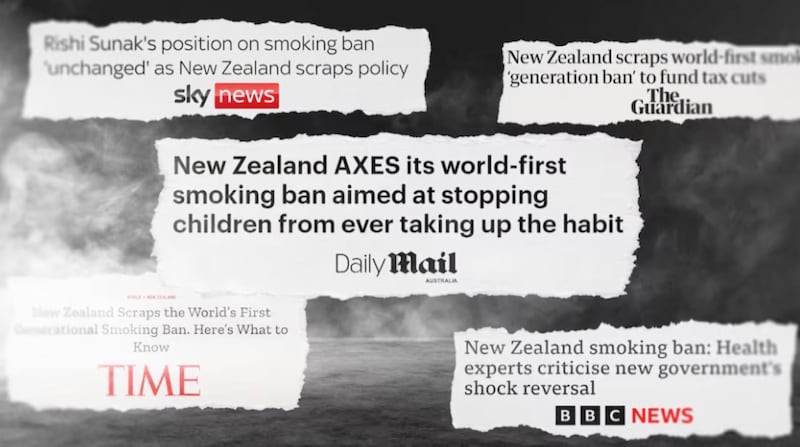‘It’s an act of public health vandalism.’
That’s according to Professor Nick Wilson (Otago University), just one of an increasing number of experts horrified by the Government’s commitment to repeal NZ’s groundbreaking smoke-free laws.
On the back of protests, a petition signed by around 47,000 New Zealanders, and an open letter to the incoming government from 104 NGOs, iwi, community groups, and organisations, TE AO WITH MOANA spoke with health experts both here and overseas. And with it come serious warnings about public unrest.
“The fact that this was not campaigned on, shows that they know it’s not a political winner,” says Professor Emeritus Dr Jane Kelsey, who recalls that in 2005, then MP Hone Harawira presented a private member’s bill aimed at addressing the impact of tobacco on Māori.
“They know also that Māori will resist especially because the Smokefree 2025 policy had its origins out of the Māori Affairs Committee, not the Health Committee. In a way, it crosses over with the anti-Māori policies and anti-policies that we’re also seeing. We’re going to see a groundswell and government needs to expect that.”
Mention was made that the Government intends to reintroduce pseudoephedrine, a product that was taken out of pharmacies because of fears around crime. Professor Wilson insists there is no evidence to support the Government’s claims around an increase in ram raids and illicit crime.
Chris Bostic (Policy Director for ASH US) suggests talk of black-market echo classic big tobacco ‘talking points.’
“Tasmania for instance, was considering a Smokefree generation law and they did a one-year study with some economists. They found that there would be no illicit market.”
Health Not Wealth
“It’s the kind of thing that people don’t usually say out loud.”
Bostic was staggered when he heard New Zealand’s Finance Minister Nicola Willis admit on NEWSHUB NATION that tobacco excise informed the Government’s intention to roll back NZ’s globally acclaimed Smokefree legislation.
“What you saw in the pre-election fiscal update was that Treasury assessed that the effect of drastically reducing the number of shops that could sell tobacco products, de-nicotising those products, and introducing a range of restrictions would significantly reduce revenue to the Crown.”
Speaking to Te Ao with Moana from Washington DC, the ASH policy director described the Minister’s comments as “not only unconscionable” but also “simply wrong.”
Wilson is adamant that extensive modelling which led to the existing legislation points to economic as well as health benefits.
“We have very good data in New Zealand on the economic impacts of different diseases,” says the University of Otago professor. “So, when we looked at the tobacco-related diseases, we could see for each one - for lung cancer, for heart disease - what impact being sick from those diseases had in terms of income…the government will get more income tax when citizens are healthier and are protected from tobacco-related harm ….it amounts to $46 billion by 2050. So that is a massive amount of money that’s back in people’s pockets. And much of that economic benefit would go to Māori communities as well.
The story on Te Ao with Moana was a follow-up to a sit-down with Sir Collin Tukuitonga. The respected medical professional resigned as the chairperson of Te Whatu Ora Pacific Senate and other government advisory groups, citing the repeal of the Smokefree legislation as his key reason, describing the government’s rationale behind the U-turn as “immoral.”
“Freedom of Choice”
While smoking statistics have reduced over the years, Māori smoking rates remain way higher than those for non-Māori.
ACT leader David Seymour suggests people ‘exercise their own choice….and not have five million people living in a nanny state.’
“It sounds good at a very superficial level,” longtime smoke-free advocate Shane Bradbrook told Te Ao with Moana, “because it speaks of freedoms and liberty. But they fail to talk about the addiction.”
Catherine Manning (Kōkiri Marae) works with smokers at the Takiri Mai te Ata Regional Stop Smoking service and says every smoker she comes across wants to quit.
“They have a great desire to quit. But what they say to us constantly is, make it easier for us to quit by changing the environment we live in.”
Bradbrook urges the NZ government to recant its proposed backtrack of amendments to the Smokefree Environments and Regulated Products Act 1990.
Lack of Oversight
Professor Kelsey presented submissions at the 2010 Māori Select Committee Hearing into the impact of tobacco. The findings led to the Smokefree commitment announced by National a year later. Kelsey has concerns about the process.
“Whereas progressive tobacco policies have gone through the kind of regulatory processes of exposure drafts, consultations, proper legislative processes backed by the Framework Convention on Tobacco Control, bad tobacco policies somehow manage to slip in through the backdoor.”
Kelsey suggests there is a risk, real or perceived, of exposure to the influence of big tobacco.
“There’s a real irony that the ACT Party, which has been campaigning around regulatory responsibility and participatory processes in democratic decision-making and going through all these complex steps of ensuring that you have the most robust evidence-based legislation, gets thrown out the window when it’s politically inexpedient to do so. There is plenty of background research and regulatory material on this to show that the legislation is justified and the fact that they are bypassing those processes, not only as hypocritical but also suggests that they don’t think it could stand up to robust scrutiny.”
Watch the full story here.
Te Ao with Moana (Whakaata Māori)
A finalist for Best Current Affairs at the 2023 Voyager Media and NZ TV Awards, the series is off-air until 2024. Watch all stories online.


